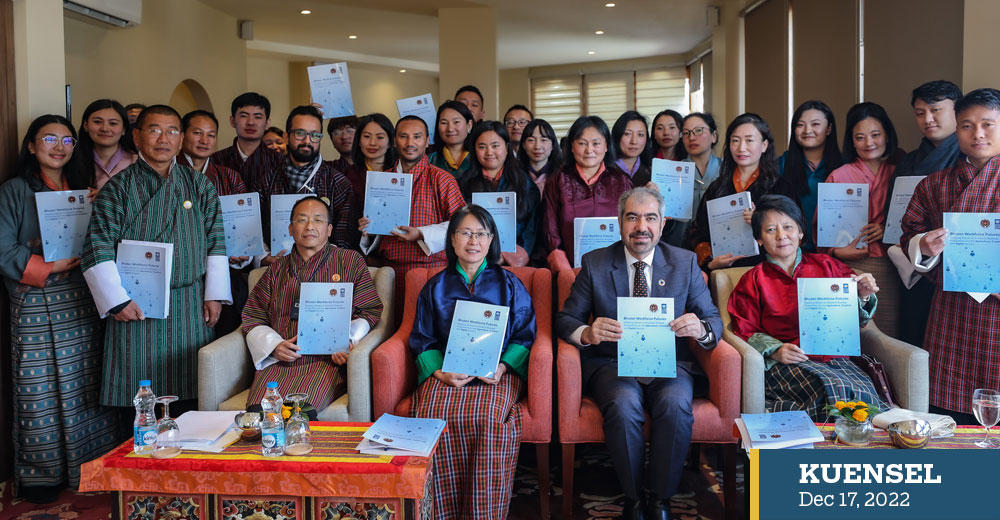… to suit the changing work nature and landscape
YK Poudel
Bhutanese farmers, the driving contributors to Bhutan’s agricultural sector will have a changing nature of work, workplace and workforce through Rural Renaissance and Brand Organic Bhutan, according to the labour ministry and UNDP’s workforce’s future report launched on December 15.
The report provides a 15-year outlook for workforce demand in the country.
Titled “Bhutan Workforce Futures: Stepping Stones to Industrial Strategic Propositions for the Agriculture, Creative and Digital Sector,” the report explores future skills required in the creative, agriculture and digital sectors in the context of changing nature of work, workplace and workforce.
As per the report, social, political and digital factors enabling a workforce prepared for the future, infrastructure, specialisation and value-addition skills were seen to be prominent in enabling a workforce which is prepared for the future.
Today, there is a steady increase in youth unemployment in Bhutan over the years. According to the ‘Statistical Yearbook of Bhutan 2022’, the overall unemployment rate was 4.8 percent in 2021, while the youth unemployment rate was 20.9 percent.
Agricultural Sector
Rural Renaissance highlights Bhutan’s subsistence farmers as a source of transformation, the potential to build a new economy through their farming knowledge for climate resilience and bringing them into the formal economy.
Brand Organic Bhutan highlights Bhutan’s position to take advantage of the global organics movement and become a commercial producer and exporter. Brand Organic Bhutan is an outward-looking proposal to build Bhutan’s commercial organics sector and use it to bring new technologies into the whole sector.
Creative sector
From handicrafts to media and storytelling to cutting-edge digital productions, creative industries cover a wide range of activities, products and services. Bhutan Creative Collaborative Community supports small-scale creative producers to strengthen their livelihoods and Druk Pop Global, which emphasises bringing Bhutanese creativity to the world were seen to be major drivers for Bhutan’s future workforce.
Digitisation of creative industries was a major demand in the sector.
Digital sector
Bhutan’s challenge is to use the digital revolution. The report suggests two industrial propositions changing the mindset towards digital technologies: Connected and Safe, which focuses on universalising access to the internet; and Bhutan Digital Living Lab, which focuses on developing a digital sector that can do problem-solving.
The Labour secretary, Tashi Wangmo, said that in the absence of an economic roadmap, this report will serve as a guide to the three sectors in preparing future workforce and tackling issues through the proposed interventions.
“One of the key ideas is that a functioning and thriving workforce is not just dependent on supply-side reform, but also requires investments in the demand-side enabling people with the right mix of skills and abilities to be absorbed by the economy,” the secretary said at the launch.
The UNDP Resident Representative, Mohammad Younus, said that a major transformation is witnessed all over the world – from advances in technology to the impact of climate change, the nature of production to employment and demographics. “The report is a future workforce roadmap that highlights strategies to confront these challenges and, more importantly, leverage opportunities from technological advances and innovation.”
“We stand ready to support the building of inclusive and robust creative, digital and agriculture sectors in Bhutan,” Mohammad Younus said.
One of the participants, Sangay Rinchen (popularly known as farmer Sangay) who owns a small-holding family farm, Happy Hill Farm in Punakha said that the food and farming sector will serve as a living lab in the current socio-economic transformation. “With the support from the ministry of labour and human resource, we aim to become a smart new generation family farm,” said farmer Sangay.
The report was prepared with technical support from the Action Foresight firm and financial support from UNDP Bhutan.


